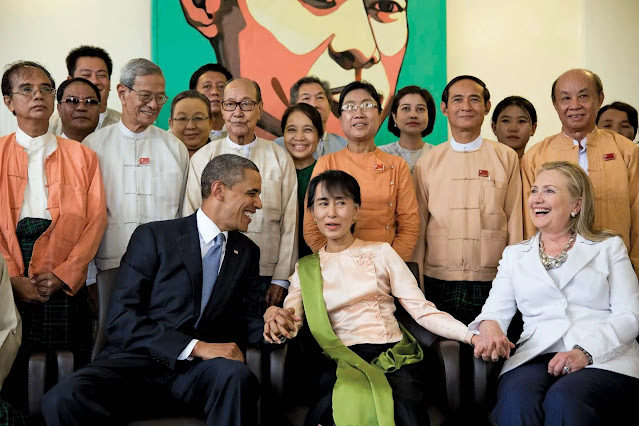Aung San Suu Kyi (1945 – ) Burmese opposition leader
Aung San Suu Kyi Biography
Aung San Suu Kyi is a woman of immense courage and conviction. Born in Rangoon, Burma (now Yangon, Myanmar) on June 19, 1945, she is the daughter of General Aung San, the founder of the modern Burmese army and the man who negotiated Burma's independence from British colonial rule. Her mother, Khin Kyi, was a prominent Burmese diplomat.
Early Life and Education
Aung San Suu Kyi grew up in a family that was deeply committed to the cause of Burmese independence. Her father, General Aung San, was assassinated when she was just two years old, but his legacy continued to shape her life. She attended schools in Burma and India before going on to study at St. Hugh's College, Oxford University, where she earned a degree in philosophy, politics, and economics.
Marriage and Family Life
After completing her studies at Oxford, Aung San Suu Kyi settled in New York City, where she worked for the United Nations. It was there that she met Michael Aris, a British academic. They married in 1972 and went on to have two sons, Alexander and Kim.
Political Awakening
In 1988, Aung San Suu Kyi's life took a dramatic turn when she returned to Burma to care for her mother, who was seriously ill. It was a time of great political upheaval in Burma, with massive protests against the military government that had been in power since 1962. Aung San Suu Kyi became a leading figure in the pro-democracy movement, and in 1989, she was placed under house Arrested by the military government.
Years Under House Arrest
Aung San Suu Kyi spent much of the next two decades under house arrest, unable to leave her home or communicate with the outside world. Despite this, she remained a powerful symbol of the pro-democracy movement in Burma, and she was awarded the Nobel Peace Prize in 1991 for her commitment to non-violent political change.
Release and Political Career
In 2010, Aung San Suu Kyi was released from house arrest, and she went on to play a key role in Burma's transition to democracy. She formed the National League for Democracy (NLD), which won a landslide victory in the 2015 general election. Aung San Suu Kyi was appointed State Counsellor, a position equivalent to that of prime minister, and she played a central role in shaping Burma's political and economic reforms.
Controversies
Aung San Suu Kyi's political career has not been without controversy. In recent years, she has been criticized for her handling of the Rohingya crisis, in which hundreds of thousands of Rohingya Muslims have been forced to flee from Burma to neighboring Bangladesh. Aung San Suu Kyi has been accused of failing to take action to stop the violence against the Rohingya, and many have called for her Nobel Peace Prize to be revoked.
Legacy and Impact
Despite the controversies, Aung San Suu Kyi remains a towering figure in Burmese politics and a symbol of courage and conviction for people around the world. Her commitment to non-violent political change and her steadfast opposition to authoritarian rule have inspired countless people to fight for democracy and human rights in their own countries.
Conclusion:
Aung San Suu Kyi's life story is a powerful testament to the strength of the human spirit and the enduring power of hope and determination. Her legacy will continue to inspire generations













No comments